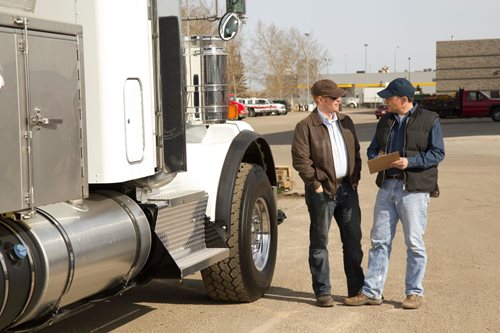
Being a Driver Trainer is an important position in a trucking company. It’s also one of the most stressful. Taking someone who has little to no experience behind the wheel of a big rig and teaching them everything they need to know to be safe and successful in this industry, can be overwhelming for the trainer and the trainee/student. So, here are a few things to keep in mind before jumping into the trainer pool.
Do it for the Right Reason
Companies generally pay trainers extra. Whether it’s a flat sum or a bump in mileage pay, there is a draw to the extra cash. Don’t let that money be the sole reason for becoming a trainer. The motivation should be taking the knowledge you’ve obtained from your experience, and passing it on to a new driver. My company pays its trainers very well, but I often joke that training is almost like a cut in pay for me. I’m not nearly as productive as I am when I’m not training. Taking the time to teach planning, practice backing up, and everything else that comes with training, can reduce productivity. That’s OK. Our goal as trainers should be to set our students up for success. That is a big reward to me. Let their success motivate you!
Training Takes, and Tests, Patience
I believe the most important characteristic of being a good trainer is patience. Not only practiced, but perceived. Trainees don’t know what they don’t know, and sometimes it’s easy to just assume they understand the “simple” stuff that we do, without even thinking about it. Sometimes these things need to be explained over and over again. Even after explanations and demonstrations have been performed multiple times, they still may not quite get it. So, even when we’ve gone over it several times, you have to be patient with them. Screaming, name-calling, or just doing it for them, isn’t doing anybody any good. If they think you are flustered, they will become flustered too.
Make Sure You Can Handle a Full-Time Roommate
Close quarters and no way to escape can turn bad very quickly. Your trainee will have to make adjustments, too. Before they jump on your truck, set up a phone call with them and manage expectations about life in the truck. Explaining work schedules, cleanliness expectations, and anything else you think of, may make living in close quarters easier. It’s better to talk on the phone and get things explained before finding you’re incompatible, 1000 miles from home. This may be your house, but you invited them in. Making them as comfortable as possible makes for a better experience for both of you.
Know how to Communicate in Different Ways
Different people learn in different ways. Some learn by repetition. Some learn by demonstration. Some learn by having the how’s and why’s explained to them. They need to understand what causes what. Part of becoming a good trainer is figuring out how your trainee learns and using techniques to help them. This points right back to the “patience” part. If one way isn’t working, be willing to try another.
Be Willing to Let it Go
Training is stressful and can take a lot out of you. Doing it for long periods of time can cause you to just start to phone it in, or even hate it. Don’t be afraid to let the people managing your training program know that you need a break. When you are used to having the truck to yourself and having things the way you like them, having a full-time passenger can add more stress to an already stressful job. Taking a break from training to just be by yourself isn’t a bad thing - in fact, I recommend it. That’s why I started out with not just doing the job for the money. It’s hard to give up the extra cash once you are used to it.
I hope this helps if you are thinking about becoming a trainer! It’s a big decision. One more thing though…make sure you explain what team showers really are. Most of them don’t know that you each get a separate shower. The look of confusion and worry is priceless, but someone could get hurt. =-)